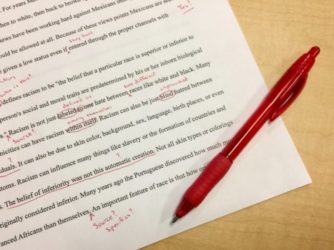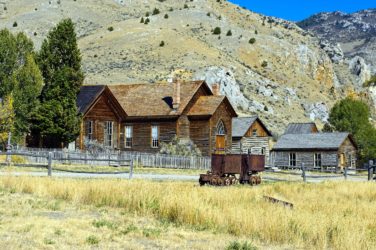
My writing life began at age 15 when I was tapped to be the editor of my high school newspaper. Honored? Frightened is more like it. “I can’t do this,” I thought. I hadn’t the faintest idea what was expected of the editor-in-chief of our paper. Whatever it was, I was sure it was out of my reach. Nonetheless, I said yes.
Somehow, I figured out how to do my job. I learned what a pica was. I knew the difference between a serif and sans serif font, italics and Roman, and about leading and other magic words. At the time, I knew I was good at English, but by no stretch did I consider myself a writer. In fact, I was awed by the contributions that came to me. But I began to realize that I was an effective editor.
In college, my efforts took a political turn. I wrote impassioned letters to the university newspaper about free speech. Those were the days of panty raids, and I was enraged by the college’s attempts to “abrogate our rights to free speech” as I so eloquently phrased it. Having my letters published made me feel like Joan of Arc. I was full of myself, and my writing was laced with polemic.
After college, I worked in Boston, editing hospital newsletters and journals. From there, I slowly worked my way up the career ladder—first as a full-time editor at M.D. Anderson Hospital and Tumor Institute, next as Manager of Biomedical Publications at the University of Oklahoma Medical Center, and then on to management positions at the Mayo Clinic and Abbott Laboratories. By the time I was through, I’d edited literally hundreds of scientific papers and books and, without realizing it, picked up potential freelance clients along the way.
In 1985, I opened my own freelance agency in Florida, MedEdit Associates, serving scientists I’d already worked with through my years as a paid employee. They remembered me and wanted me to edit their work. By the year 2000, I’d put away enough money to retire comfortably and pursue writing related to my personal interests.

I’ll always have a place in my heart for editing. Dissecting someone’s prose is like getting an inside view of their brain. I found that I often understood their thinking better than they. Writing betrays how one’s mind works. (You can run, but you can’t hide.)
Editing has helped me overcome my own frailties. Seeing other people’s weaknesses helps me identify my own. I’ve learned to define what it is that I do wrong, how I lead myself astray.
One of my weaknesses is succumbing to the charm of eloquent language. It requires two or three revisions for me to negotiate a clear, straight path to the bull’s-eye. Occasionally I indulge in polemic. I use too many adverbs. I often use the passive voice when the active voice would be clearer and more to the point. I forget to use lead sentences to launch each paragraph, overlooking the importance of continuity. I drift off on tangents, not completely aware of where I intend to head until the last revision. Many of my sentences are too long. Among my minor infractions, I misspell some words (“stationery” for “stationary” and vice versa). I use too many em dashes—a minor sin, but a sin nonetheless.
Once in a blue moon, I come across writing that’s pure, clear, and brushed with genius. I take my hat off to authors who are honest, straightforward, and earnest. It’s comforting to know that they have an unclouded view of what they did, why they did it, and what they found. Usually, they are humble, direct folks who have no use for grandstanding or posturing. They are an inspired minority.
Some famous writers who began their careers as editors and went on to become published authors include Bret Harte, Malcolm Cowley, William Shawn, Carl Sandburg, H. L. Mencken, and Dave Eggers.

Bret Harte was an American short story writer and poet, best remembered for his short fiction featuring romantic figures of the California Gold Rush. He started his career as an editor at California newspapers.
Malcolm Cowley, a respected name in literary circles, remains an unsung hero in the popular imagination. He was the savior of William Faulkner’s dwindling reputation, editor of Kerouac’s On the Road, and discoverer of John Cheever. Some of Cowley’s editorializing on the great books is as important as the books themselves.
William Shawn was editor of The New Yorker, a position he held for 35 years. Shawn gained a reputation among many of the magazine’s contributors as a skilled and empathetic editor of both fiction and nonfiction. His own writings were submitted under the pseudonym Daniel Chase.
Carl Sandburg, United States Poet Laureate, began his editorial career as a journalist for the Chicago Daily News. Later he wrote poetry, history, biographies, novels, children’s literature, and film reviews.
H.L. Mencken began his career as an as editor. His work brought him in touch with many great writers and publishers, with whom he eventually became friends: Theodore Dreiser, F. Scott Fitzgerald, Anita Loos, Ben Hecht, Sinclair Lewis, and Alfred Knopf, among others. Mencken published his own work under various pseudonyms.
Dave Eggers, author of the best-selling memoir A Heartbreaking Work of Staggering Genius (finalist for the Pulitzer Prize) started his writing career doing temporary editorial work and freelance design for a California newspaper. Eggers is also the founder of McSweeney’s, a literary journal. In 2002, Eggers published his first fully fictional novel, You Shall Know Our Velocity!

Like many of us, these writers started with baby steps, sharpening their editorial pens on the prose of others and gradually reaching the point where they could stand for themselves.

Connie Morrison
Thanks for sharing your journey, Barbara. And I enjoyed learning about those editors who became famous writers. It seems an obvious way to become a good writer although overlooked by many including me. There is so much to learn from others and editing is one way to accomplish that.
Mary Bast
Wow! No matter the topic, your work is always powerful. And it’s interesting to hear more of your history.
Barbara Cox
I, too, didn’t appreciate all the good lessons that editorial work had to offer until I’d had several years pf experience of my own. Now, I often cite Maxwell Perkins as the editor who not only made Thomas Wolfe famous, but who discovered Ernest Hemingway and other famous authors. His own publications were largely limited to letters and essays.
Joan H. Carter
Hurray for editors! Love ’em. Advancing a writer’s career with editorial experience parallels the learning I’ve enjoyed from working with my pod in WAG! The variety in the work we review and in the reactions of different readers to each submission has provided me a rich learning environment to improve my writing.
BARBARA G. COX
I’ve learned as much about writing from editing as I have from actual writing!
Ann~Marie Magné
Joan’s words and your response said it all for me.